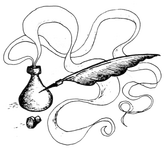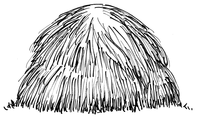I’ve got a gut feeling that….
Dear old and new friends,
A “gut feeling” is an occasionally heard reference for an inspiration or a hunch. “Trust your hunches” is wise advice, even if it sounds like something you would find in a Chinese Fortune Cookie. It originated from an old superstition that touching the hump on the back of a hunchback brought good fortune. Japanese Samurai warriors were trained not to react to some sudden unexpected event intellectually, rather to respond by directions of their belly brain, their guts. Even Shakespeare in Act II of his Troilus and Cressida refers to it when the actor Thersites demeaningly says of Ajax, “(he) who wears his wit in his belly, and his guts in his head.”
To the ancients this bodily turnaround of brains and guts was more understandable than it is today to us since we only consider our intestines as organs of disposal of waste. However, not for the Greeks. In Mark’s Gospel his original Greek word for compassion literally refers to a “churning of the gut!” When we’re encouraged to be compassionate towards the poor, the less fortunate or aliens, we think of that as a socially good idea, not anything that should feel like a belly ache. It could even be asked, do those who upon seeing the homeless and hungry who feel nothing suffer from constipation? That same Greek word for compassion is used for pity. Yet for us to pity some afflicted person usually means to mentally “feeling sorry” for them, not to have some agitation and heaving of your intestines.
We consider of our brains and our intestines as being not only at opposite ends of our bodies but worlds apart. We give little thought to our intestines as long as they are working properly, yet your brain and your guts are actually intimately linked! Your brain is anatomically isolated, guarded by a blood-brain barrier that allows the blood to bring in nutrients, but keeps out any pathogens and inflammation. However, of your needed brain chemicals about 5O% of the dopamine (a neurotransmitter that helps control the brain's reward and pleasure centers) and the vast majority of serotonin (the brain chemical crucial to mood and motivation) originate in your intestines!
Inspirations, sometimes symbolized by a large illuminated light bulb over the head are, along with hunches, considered to descend from above instead of ascending from out lower regions. Poets, artists, or home kitchen cooks, when stalled by some obstacle have been inspired to create an entirely new masterpiece or delicious dish. Inspirations don’t come in eye-blinding lightning bolts from above but mysteriously invisibly after a silent pause, as was the case with Arturo Toscanini.
Arturo Toscanini (1867-1957), the brilliant Italian conductor, during a rehearsal of Debussy’s La Mer was unable to describe to the orchestra the effect he wanted them to achieve with a certain passage of music. Stymied, he paused, and closed his eyes for a moment. Then he quickly took out his silk handkerchief from his coat pocket and tossed it up high in the air! The orchestra looked up mesmerized as they watched the slowly swirling, graceful, descending silken scarf. When it finally settled on the floor, Toscanini smiled and said, “There, play it like that!”


 RSS Feed
RSS Feed